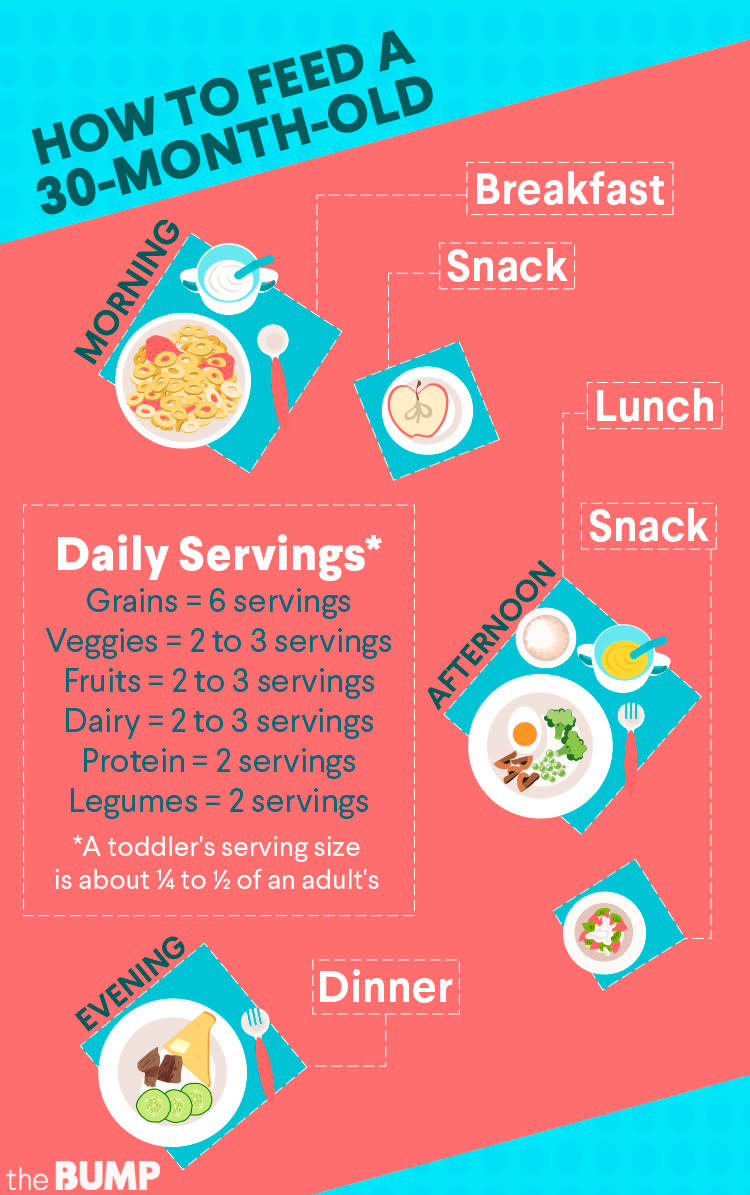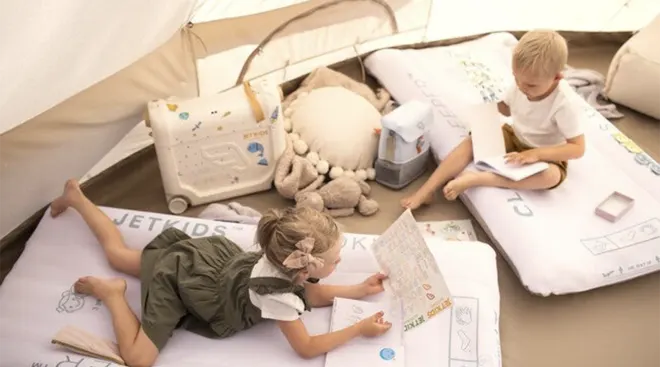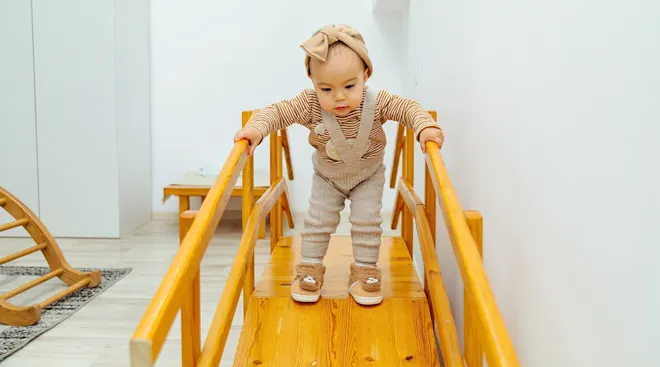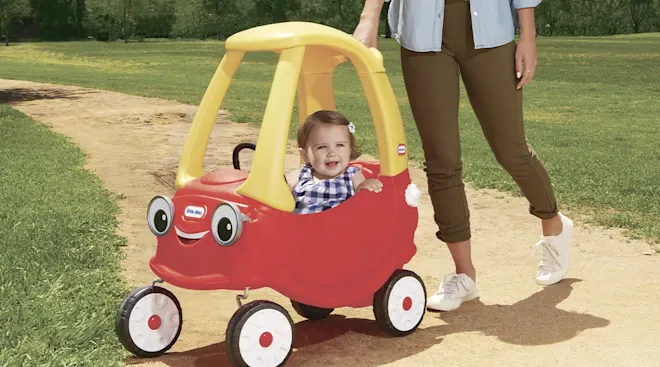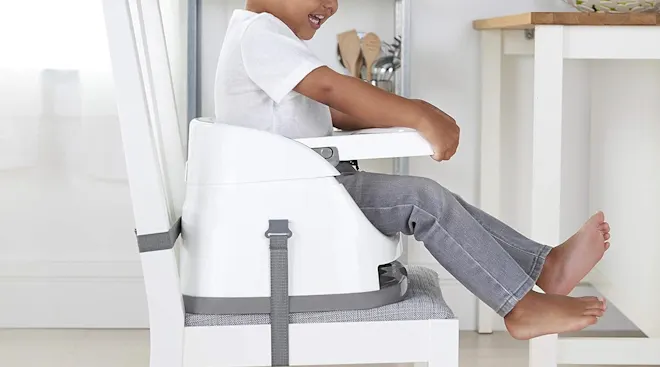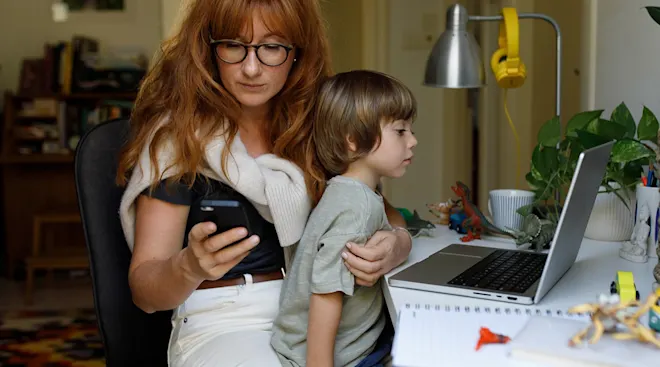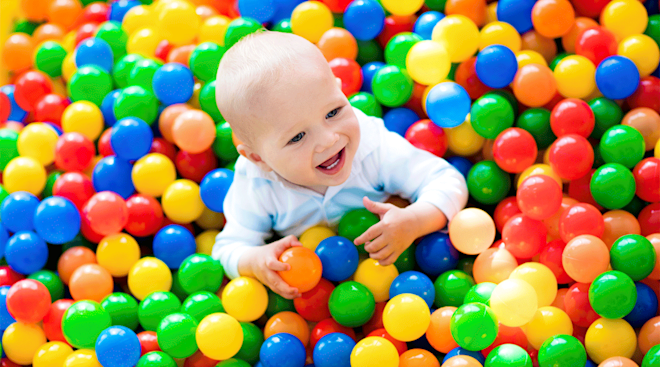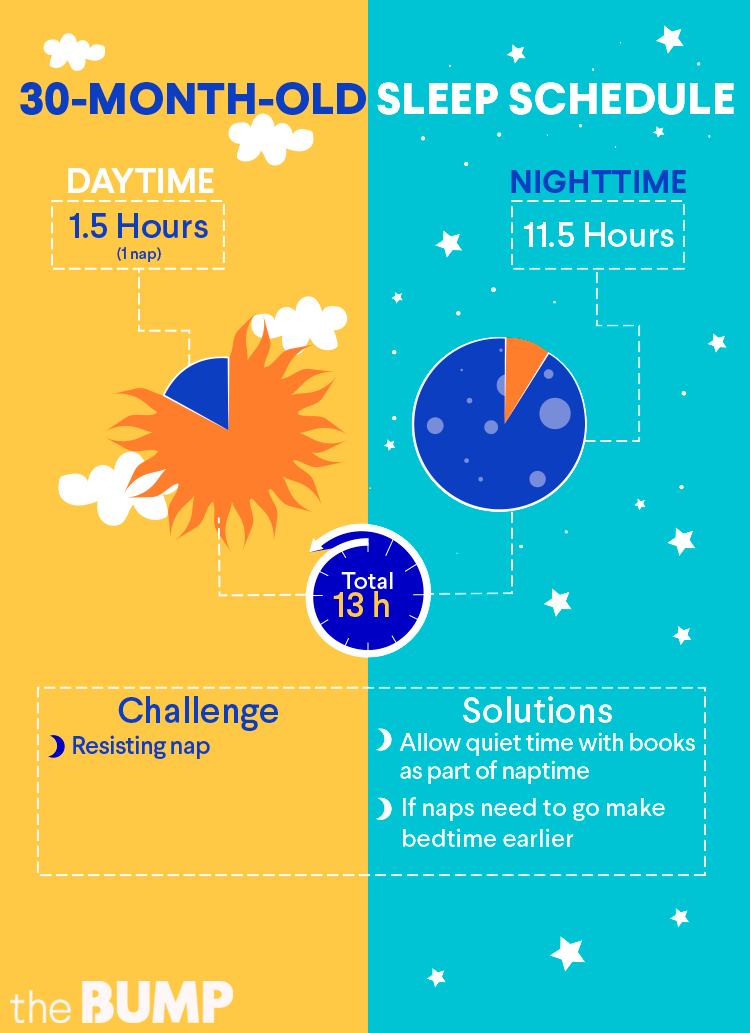Can you believe you have a two-and-a-half year old on your hands? Where has the time gone? While the past few months (and years!) have likely flown by, we’re betting it’s been ever-so-exciting watching your 30-month-old interact with the world.
So what do you have to look forward to this month? Lots! Your toddler is probably hitting all kinds of 30-month-old milestones. Some toddlers are speaking up to 250 words at this time, and some are fully potty trained—but children grow and develop at different speeds. Keep reading to learn what you might expect around this stage, including toddler behavior, sleep routines and meal schedules.
The 30-month checkup is when the pediatrician checks your child’s growth and development to be sure they’re making progress as expected.
Average weight for a 30-month-old is around 28.8 pounds for girls and 29.9 pounds for boys. Average height is around 35.6 inches for girls and 36.0 inches for boys, according to the US Centers for Disease Control and Prevention (CDC).
30-month-old milestones
“What should my 30-month-old be doing?” you ask? A toddler at this age is likely hitting 30-month-old milestones left and right. Keep an eye out for the following developments:
- Speech. At 30 months old, speech development is happening fast. It's normal for a 30-month-old’s vocabulary to be around 200 to 1,000 words; your child may also be using two- or three- word phrases. A 30-month-old who’s not talking may need to have a hearing evaluation and/or may need some help from an early intervention program. Discuss any concerns you may have about your child's speech development with your pediatrician.
- Motor skills. Thirty-month-olds can usually walk up and down stairs, kick and throw a ball, jump and build a tower of at least eight blocks.
- Teething. In a 30-month-old, teething may be happening. Also known as the 2-year molars, second molars tend to erupt between 23 and 33 months. And since they're big, it can be a painful process. The good news is they're the last teeth to come in until around age 6, when kids can better deal with the discomfort, so soon, you'll be done with teething woes.
- Potty training. Some 30-month-olds are fully potty trained, and some aren’t ready to start yet. It all depends on your child's interest level and abilities. To potty train a 30-month-old boy or girl, your child must be able to recognize when they have to go to the bathroom and must be able to pull their pants up and down. A weekend at home without training pants could help along the process; if it doesn't, that may mean your child just needs more time. Take a break before trying again later.
30-month-old behavior
- Tantrums. At 30 months old, tantrums are still common. But take heart: The peak time frame for tantrums tends to be between 18 and 36 months, so soon you might notice a decline in their frequency. If your child has several tantrums a day, discuss it with the pediatrician; some kids need extra help learning to calm themselves down.
- DIY. Your child can probably undress themselves now; some 30-month-olds pull on their own pants and socks too.
- Fickleness. Your kiddo is torn between wanting to be a big kid and wanting to be a baby. Some days, they might do things on their own, and others, they insist you do it all. Some parents find that their 30-month-olds are well behaved at school or daycare but wild at home. They may be anxious or shy around strangers too.
- Regression. It's normal for a 2-year-old to regress in some ways, such as starting to tantrum more or having more potty accidents. Maybe your child asks for an old lovey or pacifier. This is often just a normal part of growing up, but tell the doctor about any setbacks that concern you.
Bring up any health questions or concerns to the doctor at the 30-month checkup. Some common health questions parents of 30-month-olds have are:
- My 30-month-old has diarrhea. What should I do?
- My 30-month-old is constipated. What should I do?
- My 30-month-old is throwing up. What should I do?
- My 30-month old has a cough. What should I do?
- My 30-month-old has a fever. What should I do?
While your kid might wish they could eat the same three foods all the time, continue to offer new flavors, textures and styles of cooking. While they may not always love it, just getting them used to having new things on their plate may help your child warm up the idea of trying out different dishes.
How much should my 30-month-old be eating?
Two-year-olds should continue to eat three meals per day, plus one or two snacks. Offer a variety of foods in all food groups—vegetables, fruits, grains, protein and dairy—daily. Portion size isn't big at this age: Expect your kid to eat only ¼ to ½ as much as an adult.
Your 2-year-old can now drink 1 percent or skim milk; talk to your doctor about which milk is right for your toddler. Try to offer low-fat dairy products too, such as yogurt and cheese. Doctors recommend kids ages one to 3 get 700 mg of calcium per day. Fat should account for 30 to 35 percent of your toddler's daily calories.
What to feed my 30-month-old
Looking for some tasty and nutritious meal inspiration? Check out these food ideas for a 2-year-old:
30-month-old feeding schedule
30-month-old eating problems
Picky eating may still be a big food issue at this age. The 30-month checkup with your pediatrician is the perfect time to bring up any worries you may have about your child's eating habits. The doctor will weigh and measure your child to be sure they're growing at a healthy rate and may check for an iron deficiency. Their findings may give you peace of mind that everything's A-okay, or they may prompt them to prescribe a vitamin supplement. The doctor may also give you advice on how to get your child to eat more nutritious foods.
Sleep is super important for any kid, not just 30-month-olds. Kids need sleep for growth and brain development and to keep their mood in check.
How much sleep does a 30-month-old need?
Most 2-year-olds need around 11 to 12 hours of nighttime sleep, plus a nap of about 1.5 to 3 hours, for a total of about 13 to 14 hours of sleep per day.
30-month-old sleep schedule
Every kid is different, but your child's schedule may look something like this:
30-month-old sleep problems
For a 30-month-old, sleep regression can happen. If your child was previously sleeping just fine at night but is suddenly waking, it can disrupt the whole family's routine. Some kids become fearful of the dark and some just miss their parents. If there isn't a health concern that's waking your kid, it's good to be firm about bedtime boundaries. Calm your child down, put them back to bed and try to stick to the routine as much as you can.
Some kids around this age refuse to take a nap. And honestly, there's not much you can do about it. As the saying (kind of) goes: “You can lead a kid to a bed but you can't make them sleep.” Continue to block out time each afternoon for a nap or a rest. You can tell your child it's okay to look at books quietly in their room. For some children, this is enough to bring on a nap—but others are never going back to daytime sleeping. If you find your kid really isn't napping anymore, it's okay to give up on it and start putting them to bed earlier at night.
In a 30-month-old's eyes, playtime is just fun—but it's also helping your child develop. So what to do with a 30-month-old? Some fun activities, games and toys for a 30-month-old include:
- Puzzles. Step back and let your child have a feeling of accomplishment by putting the pieces together on their own. Of course, you can step in and help if they're getting frustrated.
- Coloring. Your child's dexterity is improving. They may even be able to draw some simple shapes.
- Clay or Play-Doh. Working with their hands can help keep a wiggly toddler busy on a rainy day.
- Take your toddler to their 2.5-year (30-month) checkup. Many pediatricians like to see kids around 30 months for a well-child visit. That’s because a lot of development occurs between ages 2 and 3, and it's important to check things out at the midpoint. The doctor will probably ask how many words your child says. They’ll also ask about motor skills and may even ask your child to demonstrate some of them, such as walking and jumping. This could be a fun visit!
- There aren't typically shots at this visit, but your child may get any vaccinations they didn't get at previous appointments. The doctor may also do a blood test for iron-deficiency anemia and/or lead poisoning if this was not done during the 24-month visit.
- Schedule your child's 3-year checkup.
- Don’t underestimate the power of reading to a 30-month-old. Toddlers at this age will likely have a favorite book and will want you to read it over and over again. Even if you’ve read the same book a million times, do it again! Reading to toddlers can help them develop more advanced and complex vocabulary and set them up for learning to read on their own (eventually).
- It’s never too early to start teaching toddlers the concept of responsibility. The 30-month mark is the perfect time to begin introducing chores. And believe it or not, many toddlers will love the opportunity to help you do “grown-up” tasks. Start off with easy tasks, like cleaning up toys and throwing trash away.
- Along with incorporating responsibility comes instilling rules. Yes, a toddler is likely to ask a lot of questions and push boundaries, but it’s important to stay firm and consistent. Remember, children love (and crave) routine and repetition, so continue repeating rules until your child learns.
- Is your 30-month-old baby having trouble with separation anxiety? It’s not uncommon for children at this age to make a fuss when you leave them under someone else’s care. While it’s tempting to slip out of the house unnoticed, make sure to say goodbye to your kiddo to avoid confusion and panic when they realize you’re gone—just you don’t make a big deal out of leaving. With some time and practice, it’ll get easier for both of you.
- Did your little one just crack a joke? Yes! Toddlers at this age are beginning to explore and develop a sense of humor. Encourage your 30-month-old baby to tell silly tales and use their imagination to make up funny scenarios. Don’t be surprised if you have a little comedian on your hands.
Your toddler is likely surprising you every day with new skills as they hit those 30-month-old milestones. It might feel like if you blink you’ll miss something, but don’t worry, you have plenty of time to enjoy your toddler’s growth and development over the coming weeks and months.
Please note: The Bump and the materials and information it contains are not intended to, and do not constitute, medical or other health advice or diagnosis and should not be used as such. You should always consult with a qualified physician or health professional about your specific circumstances.
Navigate forward to interact with the calendar and select a date. Press the question mark key to get the keyboard shortcuts for changing dates.


































